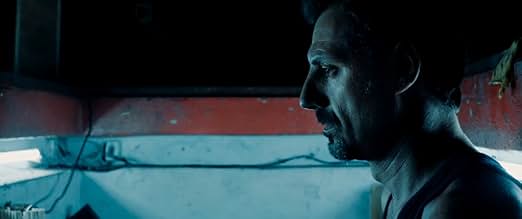CALIFICACIÓN DE IMDb
7.6/10
19 k
TU CALIFICACIÓN
Tras un intercambio emocional entre un cristiano libanés y un refugiado palestino que acaba intensificándose, los dos hombres comienzan un proceso judicial que acaparará la atención nacional... Leer todoTras un intercambio emocional entre un cristiano libanés y un refugiado palestino que acaba intensificándose, los dos hombres comienzan un proceso judicial que acaparará la atención nacional.Tras un intercambio emocional entre un cristiano libanés y un refugiado palestino que acaba intensificándose, los dos hombres comienzan un proceso judicial que acaparará la atención nacional.
- Dirección
- Guionistas
- Elenco
- Nominado a 1 premio Óscar
- 22 premios ganados y 20 nominaciones en total
Talal Jurdi
- Talal
- (as Talal El Jurdi)
- Dirección
- Guionistas
- Todo el elenco y el equipo
- Producción, taquilla y más en IMDbPro
Opiniones destacadas
A superbly constructed and written, excellently directed and wonderfully acted film. It is specifically about Lebanon, but the kind of conflict it depicts, and the attitudes taken up by the antagonists, could and do flare up anywhere. The film is even-handed in depicting the factions. Everyone has their reasons, their justifications, their excuses. The full gamut of society, from President to car mechanic, is involved, implicated, complicated. Certainly one of the best movies I've seen this year.
Lebanese filmmaker Ziad Doueiri needs no introduction, having directed a series of successful films over the years. While "West Beirut" will forever remain my favorite movie, his latest effort, "The Insult", further confirms his skill as a talented storyteller. In short: it's one of the most intense Lebanese movies I've ever seen. What makes "The Insult" so good is the way Doueiri takes a seemingly ordinary situation and builds a web of suspense around it. Adel Karam (in one of the best performances of his career) plays Toni, a Lebanese christian who can't seem to let go of the past. One day, he gets into a heated argument with a Palestinian worker (played by an excellent Kamel El Basha), which leads to a domino-like sequence of unpredictable events. Doueiri masterfully explores the dark side of each character, especially as it relates to patriotism, politics, and the consequences of taking revenge. I'd say this is Doueiri's specialty, and the sense of discomfort he creates throughout this exceptional film will hold you in its grip at every turn. And when it ends, it leaves us with much food for thought, something that's been missing from most recent Lebanese films. Having been criticized so many times for not supporting local movies, it's refreshing to finally encounter something worth recommending. Ziad Doueiri's "The Insult" is a terrific achievement.
Greetings again from the darkness. When a film opens with a statement that 'the views expressed are those of the authors and director, and not of the government of Lebanon', one quickly understands the difference in artistic freedom in that country versus what occurs in the United States, where cartoons and memes regularly poke fun at this country's President. Director Ziad Doueri and his co-writer Joelle Touma present an intense story of human nature that might happen anywhere, but since the leads are a Lebanese Christian and a Palestine refugee, that opening statement is warranted.
One morning, a seemingly innocuous exchange between Tony (Adel Karam) and Yasser (Kamel El-Basha) takes place. While watering flowers on his balcony, the overflow sprays Yasser on the street below. Yasser, a city contractor, orders his team to fix the drainage issue, and Tony reacts violently - leading to Yasser delivering the titular insult. From there, all heck breaks loose. Apologies are requested and never delivered. Appeals to rational reconsideration are made. Tony's pregnant wife (an excellent Rita Hayek) pleads with him to let it go. Yasser's boss threatens him with termination. Still, two stubborn and prideful men refuse to give in.
The subsequent courtroom drama feature other side stories, not the least of which is the relationship between the two opposing attorneys (Diamond Bou Abboud and Camile Salaheh), one a rising legal star and the other a veteran attempting to make up for a past failure. Emotions run high as two too-proud men turn what was little more than a playground standoff into a national incident being fought in the legal system and the media. Tony is a hot-head who somehow thinks an apology from Yasser is actually an apology for how Palestinians "messed up this country". Yasser's stoic nature barely shrouds his bitterness at the world since the Lebanon Civil War. History and childhood roots play a role, but mostly it's human nature that is at the core of this escalation.
Though the title is not plural, there are multiple insults slung throughout the film, each reminding us of the power of words and the futility of the "sticks and stones" phrase. Our own prejudices and preconceptions alter our views and reactions, often preventing us from standing in the other fellow's shoes. Again, this situation could have played out in most any neighborhood on the globe, but this particular locale shows various ethnic and religious groups are still grappling with what it means to live together - despite the years of wars and unrest. We don't see a great deal of Middle Eastern cinema, but three days after I watched this film, it became the first ever movie from Lebanon to receive an Oscar nomination (Best Foreign Language Film) ... proving yet again that the language of cinema is universal.
One morning, a seemingly innocuous exchange between Tony (Adel Karam) and Yasser (Kamel El-Basha) takes place. While watering flowers on his balcony, the overflow sprays Yasser on the street below. Yasser, a city contractor, orders his team to fix the drainage issue, and Tony reacts violently - leading to Yasser delivering the titular insult. From there, all heck breaks loose. Apologies are requested and never delivered. Appeals to rational reconsideration are made. Tony's pregnant wife (an excellent Rita Hayek) pleads with him to let it go. Yasser's boss threatens him with termination. Still, two stubborn and prideful men refuse to give in.
The subsequent courtroom drama feature other side stories, not the least of which is the relationship between the two opposing attorneys (Diamond Bou Abboud and Camile Salaheh), one a rising legal star and the other a veteran attempting to make up for a past failure. Emotions run high as two too-proud men turn what was little more than a playground standoff into a national incident being fought in the legal system and the media. Tony is a hot-head who somehow thinks an apology from Yasser is actually an apology for how Palestinians "messed up this country". Yasser's stoic nature barely shrouds his bitterness at the world since the Lebanon Civil War. History and childhood roots play a role, but mostly it's human nature that is at the core of this escalation.
Though the title is not plural, there are multiple insults slung throughout the film, each reminding us of the power of words and the futility of the "sticks and stones" phrase. Our own prejudices and preconceptions alter our views and reactions, often preventing us from standing in the other fellow's shoes. Again, this situation could have played out in most any neighborhood on the globe, but this particular locale shows various ethnic and religious groups are still grappling with what it means to live together - despite the years of wars and unrest. We don't see a great deal of Middle Eastern cinema, but three days after I watched this film, it became the first ever movie from Lebanon to receive an Oscar nomination (Best Foreign Language Film) ... proving yet again that the language of cinema is universal.
The Insult is the definition of a great cinematic achievement. It is the new movie directed by Ziad Doueiri and tells the story of Toni a Christian Lebanese who got into a fight from an insult blown out with a Palestinian plumber. Haunted by their past and the civil war, they went really far with it and the movie took unexpected turns and surprises. Doueiri and Touma wrote a splendid courtroom drama script that is really tense, exciting and really fair for the two sides. It reminded me of the great Sidney Lumet movies with a touch of political background. That film has great characters rich with backup stories and it wouldn't be great without the marvelous cast. Each actors gave an Oscar worthy performance. Thumbs up for Karam, Hayek and Diamand Bou Abboud. I must give credits to Camille Salemeh because he led the show for sure! Doueiri worked hard on letting the actors give their best for the characters. Cinematography and score were also on a high level here! Doueiri is a superb director. His debut West Beirut has always been every Lebanese's favorite. The Insult was competing in Venice (It won best actor for Kamel Basha and had a 5 minutes standing ovation), Telluride, TIFF and it the official submission for Lebanon at the Oscars for best foreign language movie. Daring, bold and smart, this movie is big step forward for the Lebanese cinema.
The poster for The Insult, nominated for the Academy Award for Best Foreign Film, doesn't quite do the product justice. It makes the film look like a simple tragic drama; in fact The Insult builds on its intriguing premise of a simple insult escalating, and balances feelings of remorse, tensions and even comedy and absurdity in a brisk tone and style. A film where the prosecutor and defense are father and daughter, and the shock reveal, is a film that isn't totally taking itself seriously. But it reflects on very serious wounds in the past and the lack of reconciliation after, a followup to a tragic story previously depicted in an earlier Oscar nominee Incendies. But Incendies was Canadian and The Insult is actually Lebanese, the first Lebanese film to be nominated, and it speaks in a national voice.
With only some minor violence, The Insult's story largely escalates in the courtroom, and anyone interested in courtroom films will find this great material. I had to stop myself from saying "courtroom drama," because again, it's not only that. The absurdities provoke laughs, the drama provokes thought, and The Insult has something for everybody, even people who know little about Lebanon (The film itself explains much of the gaps in knowledge for the viewer).
With only some minor violence, The Insult's story largely escalates in the courtroom, and anyone interested in courtroom films will find this great material. I had to stop myself from saying "courtroom drama," because again, it's not only that. The absurdities provoke laughs, the drama provokes thought, and The Insult has something for everybody, even people who know little about Lebanon (The film itself explains much of the gaps in knowledge for the viewer).
¿Sabías que…?
- TriviaLebanon's first Oscar nomination ever.
- Citas
Wajdi Wehbe: No one has a monopoly on suffering.
- ConexionesReferenced in Sean Bradley's First Reaction: 90th Academy Awards - Nominations (2018)
- Bandas sonorasLebanese Forces Hymn
© & P The Lebanese Forces
Selecciones populares
Inicia sesión para calificar y agrega a la lista de videos para obtener recomendaciones personalizadas
- How long is The Insult?Con tecnología de Alexa
Detalles
- Fecha de lanzamiento
- Países de origen
- Sitios oficiales
- Idioma
- También se conoce como
- The Insult
- Locaciones de filmación
- Beirut, Líbano(location)
- Productoras
- Ver más créditos de la compañía en IMDbPro
Taquilla
- Presupuesto
- EUR 2,405,039 (estimado)
- Total en EE. UU. y Canadá
- USD 1,001,305
- Fin de semana de estreno en EE. UU. y Canadá
- USD 24,957
- 14 ene 2018
- Total a nivel mundial
- USD 3,666,268
- Tiempo de ejecución1 hora 53 minutos
- Mezcla de sonido
- Relación de aspecto
- 2.35 : 1
Contribuir a esta página
Sugiere una edición o agrega el contenido que falta






























